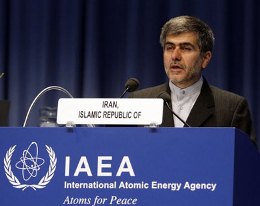 NEW DELHI, Dec 14 (Reuters) - A member of Iran's nuclear negotiation team said talks between Iran and world powers were unlikely to yield results and it makes no sense for Tehran to stop enriching uranium to 20 percent fissile purity.
NEW DELHI, Dec 14 (Reuters) - A member of Iran's nuclear negotiation team said talks between Iran and world powers were unlikely to yield results and it makes no sense for Tehran to stop enriching uranium to 20 percent fissile purity."Personally speaking, I am not optimistic," Mostafa Dolatyar told reporters at the Iranian embassy in New Delhi on Friday.
"They have made certain connections with purely technical issues and something purely political. As far as this is the mentality and this is the approach from 5+1 or whatever else you call it, definitely there is no end for this game."
Britain,�France,�Germany, United States,�Russia�and�China, a group known as P5+1, are hopeful of setting dates with Iran to continue talks, a spokesman for EU foreign policy chief Catherine Ashton, who oversees contacts with the Islamic Republic on behalf of the six countries, said on Wednesday.
'MOUSE AND CAT GAME'
Dolatyar said Iran was open to an inspection of its Parchin military complex by the U.N. atomic agency, but said there was still disagreement about the framework for such a visit, especially the amount of time inspectors would be allowed.
"This is possible, as we did several times before. But if they want do it as a mouse and cat game of course it is not possible," he said.
He accused the United States of putting political pressure on the International Atomic Energy Agency to obstruct progress.
The agency's meetings with Iran are separate from but closely linked to broader efforts by six world powers to resolve the nuclear dispute.
The IAEA failed to gain access to the military site in talks with Iran on Thursday but expects to reach a deal in January to resume its stalled nuclear investigation, the chief U.N. inspector said after returning from Tehran on Friday.
The Vienna-based U.N. agency believes Iran has conducted explosives tests with possible nuclear applications at Parchin, southeast of Tehran, and has repeatedly asked for access.
Iran says Parchin is a conventional military site and has dismissed allegations that it has tried to clean up the site before any visit.
Dolatyar is a career diplomat who heads the Iranian foreign ministry's Institute for Political and International Studies and is a member of the nuclear negotiation team.
He said Iran talked to the United States through different channels of communication, and said Iran was waiting to see Washington's approach in the second administration of President�Barack Obama.
"We have to see the signals and the indications. I don't see yet any indications, just talks," he said.
The six countries are particularly concerned about Iran enriching uranium to 20 percent fissile purity, an important technological advance that brings it significantly closer to the threshold of weapons-grade material.
Dolatyar said Iran needed the fuel for its research reactor in Tehran and for medical purposes and could not rely on the international community to supply it. He said Iran was now enriching uranium between 20 and 22 percent fissile purity.
"One year ago we needed it very much, we were ready to pay cash for it but now we now have it. Why should we close our installations and to buy from somewhere else? It is not logical."
However, he did not rule out a change of position.
"You cannot take something as predecided, everything could be subject to negotiation," he said. "It depends on the framework of negotiations and the end game."
50 PERCENT URANIUM?
Dolatyar also appeared to allude to Iran's announcement in July that it was in the preliminary stages of developing an nuclear submarine. He said Iran would enrich 50 percent uranium for peaceful and civilian purposes if it needed and supplies were not available from international sources.
"If the Iranian navy wants to change its vessels, which want to go to the Indian Ocean and beyond, instead of conventional fuel, it will use for example a small reactor."
He said Iran did not currently need to enrich uranium to such a level and reiterated that the nuclear program was entirely peaceful.
"For many reasons, theoretical, religious and practical reasons, there is no place whatsoever in Iranian defence doctrine for nuclear weapons."
By Reuters
The Iran Project is not responsible for the content of quoted articles.










